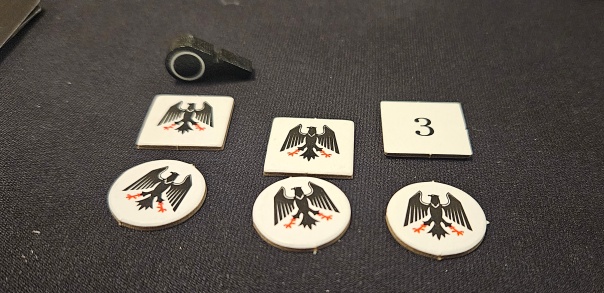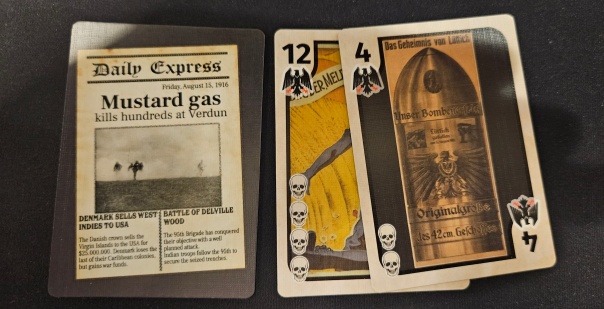Nine Months, Three Weeks, Six Days
All I play anymore is trick-taking games.
None of them are as sobering as Verdun, though.
Designed by Ren Multamäki, Verdun is indeed a trick-taker about the almost ten-month battle that took place between February and December of 1916. Far from being lurid, it approaches the topic seriously, attempting to capture some fraction of the battle’s tragedy.
Before saying anything else, I want to note that this is a team trick-taker. Verdun plays best with four people, two pairs of teammates seated across from one another, and although it’s playable with just two people — and it functions fine, it isn’t broken or anything — it very much wants the subtleties that arise when teammates struggle to communicate with each other from across the table.
Similarly, this is an atypical trick-taking game. There are only two suits, one for France and one for Germany. Your hand will generally be an even mix of both sides, a bunch of French and a bunch of German cards clustered together, regardless of which team you’re fighting for. What’s more, you’re never required to follow suit. I understand that some people regard any trick-taker without strict following rules to be more of a bidding game than a proper trickster. That’s fine. Genres are funny, boundaries are funny. Call it what you want. Point is, Verdun defies some of the usual conventions. It’s all the better for it.
Each trick is a battle. The leading player chooses one of their opponent’s lanes, each of which is a combination of one fortification and one objective. The objective is worth points if captured; the fortification is there to prevent that. Right away, the problem is that these are both placed face-down when the game begins. You have no idea what sort of resistance you’ll be facing. Maybe you’ll be charging into a high number, something nearly impossible to crack. Or maybe the defense will be token. Maybe even nonexistent.
With their lane declared, the leading player chooses a card to play. This seems simple at first. Even simplistic. There are only two suits, after all. Either your card will commit a number to your side or to the opposition. Oh, there are a few special cards. Spies duplicate the number played before them. Generals can be used as either high cards or low cards. Scouts prevent stratagems — more on those in a moment. Chaplains are… well, let’s just say you usually don’t want any chaplains charging over the top. But those are exceptions. Every card provides a number, some value added to either the French or German side. Around the table it goes, much like a regular trick. Everybody plays a card. Then you sum up those numbers. Either the attackers win or the defenders do.
It’s what happens now that sets Verdun apart. First, you determine whether the attacker has cracked those defenses. If the attacker’s sum trounces the defender’s, you flip the fortification tile and add it to the defense. Much of the time, this is enough to goose the defense’s numbers and flounder the assault. Nearly always, in fact. On the rare event that an assault succeeds, the attacker flips and takes that lane’s objective. Hopefully it’s something valuable, like an enemy headquarters or a POW camp. More often, you’ll claim a decoy. Way to go. That’s another few thousand casualties for nothing.
Speaking of casualties, cards are now sent to your scoring pile. Not all of them. If you’ve won the battle, your lowest card is claimed. If you’ve lost, you get your highest card. It’s crucial to understand what’s happening here. In effect, your most effective troops are also deadly wagers. When the game ends, you earn points from every objective you’ve either claimed or protected. These are important, of course, but the lion’s share of your score isn’t positive. While you’ll earn some points by capturing strategic objectives, the real difference comes from casualties. Every skull on your scored cards is counted up and subtracted.
Yes. Subtracted. Usually, a winning score is something like -39 to -53. Because you’ve lost those men. Shed them en masse to claim a radio or whatever. Spent countless children, brothers, fathers for the sake of a few yards.
Very quickly, Verdun becomes a game about managing death. It’s tempting to throw your best cards into the fray, but that means suffering more casualties. It gets even worse once players begin deploying stratagems, like artillery barrages and mustard gas, which deal death at even greater levels.
Instead, deploying rival cards becomes a means of ensuring your foes take those hits. Want to cripple your opposition? Send in one of their generals or some other high-value card. Of course, you risk swinging the fight into their favor. And there’s an even bigger caveat to such an approach: if only one side’s cards are played, then they win the fight uncontested and take no casualties whatsoever. They pushed into a gap, or the enemy lines had been reshuffled on the eve of an assault, or whatever. Such blowouts are rare, but they can happen. And in a game with such tight margins, claiming an objective sans casualties can be enough to swing the whole shebang in one side’s favor.
Which is saying a lot, given how much of a trudge Verdun is. This is not a game for the faint of heart. A full hand consists of sixteen tricks, a huge number of dwindling cards that communicates both the unending drudgery of trench warfare and the gradual attrition of one’s forces constantly turning over. A full session is supposed to last three hands, but I haven’t managed that yet. The result is a game that sticks around, both on the table and in the head. It’s more interesting than enjoyable, more evocative than classically playful. But it’s also a testament to the flexibility of modern tabletop gaming, that a game this light can also produce so many hair-raising risks, not to mention bemoan the awful tragedy of war. This is wargaming as anti-valor, a reminder that for every heroic yarn there are a thousand corpses packed into the mud.
This past weekend, a relative newcomer to board games joined our group. He happened to join our session of Verdun. When it was over, his jovial manner had been… not blunted, but adjusted. He tried to talk about the game and failed. Had he enjoyed it? Loathed it? Wanted to play again? He couldn’t say.
That’s the sort of game Verdun is, a formidable little thing that asks us to reframe what we mean when we say that a game is “enjoyable.” Because it isn’t enjoyable. It’s something else. Something formidable, perhaps, or meaningful. It isn’t my favorite trick-taker — not by a long shot — but it is the sort of game I’m happy to pull out now and then to demonstrate how far a set of streamlined mechanisms can go in communicating something tangible and tragic. It calls to mind The Grizzled, not only because both games are set during the Great War, but also for how both titles use subtle touches to speak about stolen childhoods and torn landscapes and unspeakable calamities. When a trick goes awry, a snippet of Siegfried Sassoon whispers in my ears:
You’d think, to hear some people talk,
__That lads go west with sobs and curses,
And sullen faces white as chalk,
__Hankering for wreaths and tombs and hearses.
Verdun will appear on Kickstarter on July 23rd. LINK.
(If what I’m doing at Space-Biff! is valuable to you in some way, please consider dropping by my Patreon campaign or Ko-fi.)
A prototype copy was temporarily provided.
Posted on June 4, 2024, in Board Game and tagged Board Games, Dragon Dawn Productions, Verdun. Bookmark the permalink. 8 Comments.





You’ve mentioned several times in your reviews that all you play is trick taking games. W. Eric Martin, editor of BGG, says the same thing. Is this a game reviewer thing?
I can’t speak for W. Eric Martin, but for me it’s a joke. There are just so many trick-takers right now!
The whistle is an inspired touch.
I love the little whistle.
I have to know… is the title of this review a reference to the film 4 Months, 3 Weeks, 2 Days?
Not deliberately! That’s just how long the Battle of Verdun lasted.
Ah – makes sense! That movie is a great filmic example of the tension between a powerful, meaningful, compelling experience and an enjoyable one (the movie is nearly unbearable), so I thought it might be relevant to your analysis here.
This game sounds fascinating! Always enjoy reading your reviews.
Ah, I see. Yeah, I don’t think there’s much parallel there. More that the game is designed to feel long, feel grueling, because Verdun was also those things.
Thank you for the kind words!